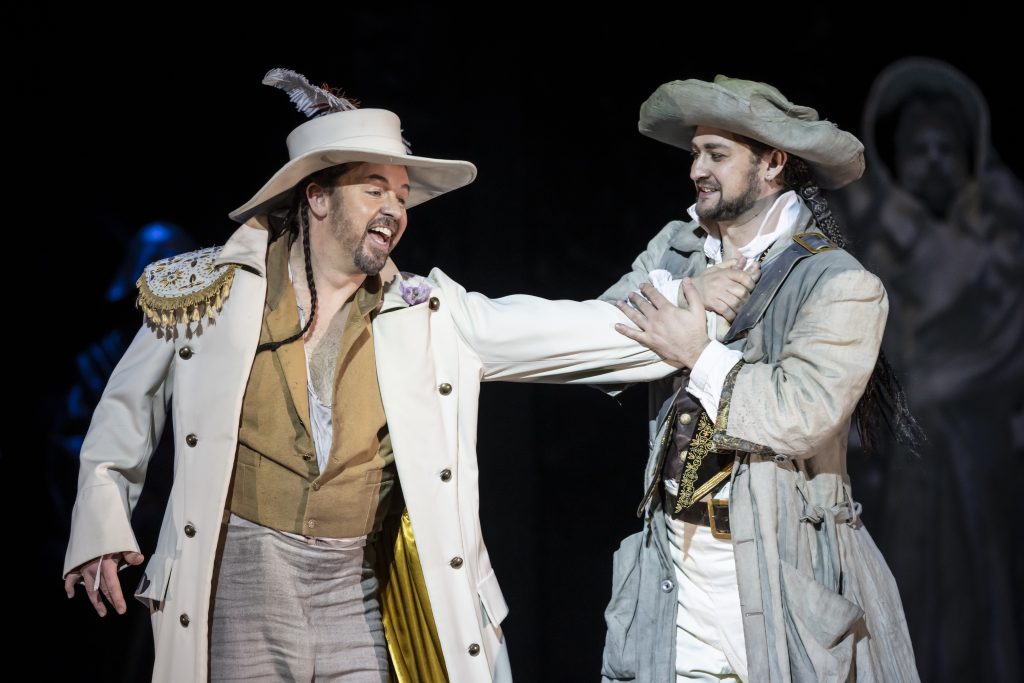
Culture Writer Frankie Rhodes reviews the opera Don Giovanni, deeming it perfect for those struggling to find opera approachable
Don Giovanni (Andrei Kymach) is a loveable rogue who constantly enters sticky situations due to his passion for women. The overture introduces airy themes on strings which contrast strong brass notes, setting the tone for an evening of delightful arias and valiant confrontations. Mozart’s playful writing combines with a stunning performance from the Welsh National Opera to make this a magnificent production.
Set in Spain, written by a German composer, and sung in Italian: this can seem at first glance to be overwhelmingly perplexing. But the Welsh National Opera keep the action clear and vivacious, and with the repeated phrases and melodies, there was no need to stare at the subtitles too often. This was my first time seeing an opera in a different language, and I found the Italian beautiful as it effortlessly rolled off the actor’s tongues. Above all, the majestic set, consisting of ornate carved wooden pieces that create different formations throughout the night, acted as a simple yet magical backdrop.
Despite the alarming sexual politics of this story, the company maintain the comic feel throughout, also allowing their characters moments to share their suffering
Despite the alarming sexual politics of this story, the company maintain the comic feel throughout, also allowing their characters moments to share their suffering. Andrei Kymach is appropriately swarve and braggish, with a voice as smooth as his way with the ladies. In a white coat with a gold lining, his decadence is verging on ridiculous, and he stands out within an impeccable colour scheme of browns, greys and golds. His private scenes with Leperello are some of the most comic, with his servant offering shades of Captain Jack Sparrow as he tries to maintain a moral compass, but more often simply goes along with the farce.
Two parallel tales of revenge are quickly established in the initial scenes, the first emerging from Donna Anna and her fiancé. As they vow to hunt down the murderer of Anna’s father, dramatic strings announce their sealing of a pact with blood, evoking the Macbeths. Later, the music dims to offer Anna a chance to describe the assault, and Marina Monzo delivers a beautiful aria in her mourning lace. This is followed by a prominent solo from Don Ottavio, which elevates him from minor character to one of the most stunning vocalists in the company.
The second revenge plot concerns Donna Elvira, a woman previously jilted by Giovanni, who now strives to warn other unfortunate victims. With a tiered patterned veil marking her as a kind of mock-widow, Sarah Tynan crafts the role as more pitiful than pathetic. In a hilarious scene, Leporello assures her that she is simply one of many heartbroken women, producing a weighty book containing records of Giovanni’s exploits to prove it. As he holds it up like a Bible, this mock-religious imagery starkly contrasts the hellish themes in the second act.
A chorus of women in flowing dresses with flower garlands signal a wedding party, where Masetto is to marry Zerlina. This causes yet more chaos as Giovanni attempts to pursue the bride, making for some fantastic group scenes with characters hiding in the nooks and crannies of the ingenious set. This is a world where women protect each other, and Elvira constantly reappears to warn women against Giovanni, declaring, ‘I’ll shout your villainy from the rooftops!’
In such an atmosphere of lies and deception, it is only fitting that there is a masked scene. This moment is spectacular with an on-stage band, regency style dancing and glittering twilight backdrop, let down only by rows of candles that seemed to fail to light. The first act ends with avengers crowding in on Giovanni from every side, leading you to wonder how exactly he is going to escape this time.
To anyone struggling to find opera approachable, I urge you to start with this production
But escape he does, and the second act offers even more comedy, this time with Giovanni and Leporello switching clothes. The action now takes place at night, with the carved walls moving forward to create a sense of claustrophobic intimacy. The audience hears more from Elvira in this act, and her mournful solo on feeling ‘wretched’ is accompanied by sympathising cello themes.
The aesthetic of the second act is far darker, with deathly figures stalking the stage, often contrasted humorously with a light-hearted harpsichord. There is a Faustian sense of Giovanni’s time finally running out, and yet the show-stopping ending is still unexpected. To anyone struggling to find opera approachable, I urge you to start with this production. The elegant set and careful characterisation result in a performance that is never confusing, but always astounding.
Rating: 5/5
Enjoyed this? Read more on Redbrick Culture!
Comments